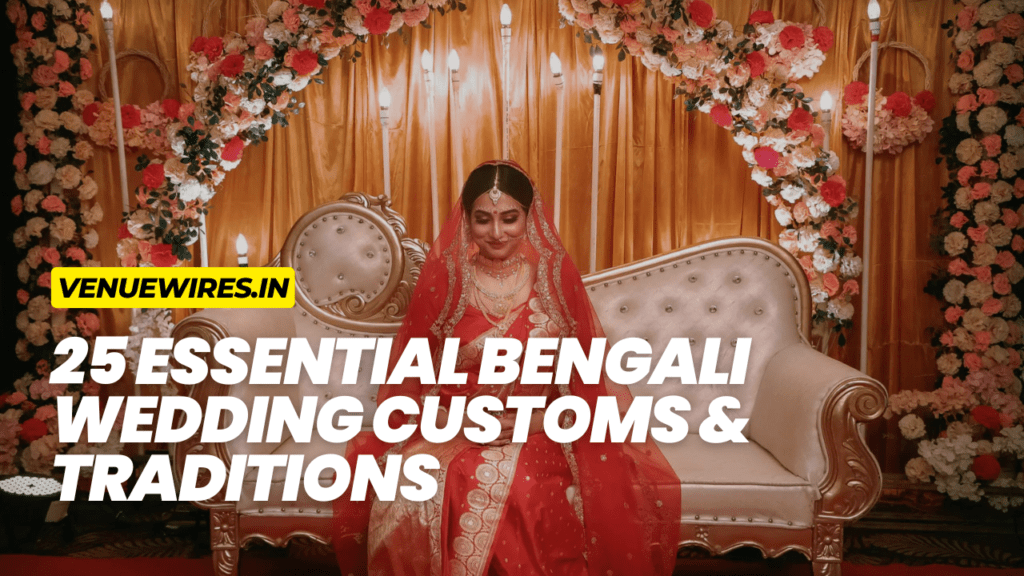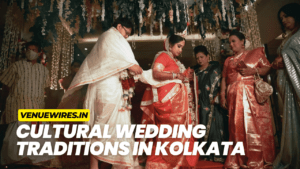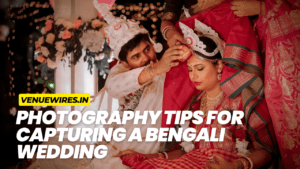Bengali weddings are a vibrant tapestry of age-old customs, rituals, and traditions that celebrate love, family, and cultural heritage. From the first steps of matchmaking to the emotional farewell, every moment is steeped in meaning and symbolism. This comprehensive guide explores 25 of the most significant Bengali wedding customs and traditions, providing a deeper understanding of the rituals that make these ceremonies truly unforgettable.
25 of the most significant Bengali wedding customs and traditions are:
1. Adan Pradan (The Matchmaking Process)
The journey to a Bengali wedding begins with Adan Pradan, where families exchange horoscopes to ensure a celestial match between the bride and groom. This traditional step highlights the importance of astrological compatibility in Bengali culture, believed to bring harmony and prosperity to the couple’s married life.
2. Aiburo Bhaat (The Last Meal)
Before the wedding, the bride and groom each partake in Aiburo Bhaat, a celebratory feast hosted by their respective families. This “last meal” as unmarried individuals is a cherished occasion, filled with favorite dishes, laughter, and blessings from loved ones.
3. Gaye Holud (Turmeric Ceremony)
Gaye Holud is a joyous pre-wedding ritual where turmeric paste is applied to the bride and groom’s skin, symbolizing purity and beautification. The ceremony is accompanied by music, dance, and the vibrant presence of family and friends, all dressed in shades of yellow.
4. Tattva (Gift Exchange)
In the days leading up to the wedding, the families exchange Tattva, a collection of gifts that include clothing, jewelry, sweets, and other items. Each gift holds symbolic meaning, representing the love and respect between the two families.
5. Shankha & Pola (Conch Shell Bangles)
The bride adorns herself with Shankha (white conch shell bangles) and Pola (red coral bangles), which are traditional symbols of marital status in Bengali culture. These bangles, worn on both hands, signify the bride’s new journey into married life.
6. Dodhi Mangal (Pre-Dawn Meal)
On the wedding day, both the bride and groom partake in Dodhi Mangal, a pre-dawn meal consisting of yogurt and rice, along with a variety of sweets. This ritual is believed to provide strength and sustenance for the long day ahead.
7. Bor Jatri (The Groom’s Procession)
The groom’s arrival at the wedding venue is marked by Bor Jatri, a lively procession accompanied by music, dancing, and much fanfare. The groom is traditionally carried in a palanquin or modern vehicle, symbolizing his readiness to meet his bride.
8. Saat Paak (Seven Circles)
As the bride enters the wedding mandap, she is traditionally carried by her brothers and circles the groom seven times, a ritual known as Saat Paak. This act signifies the bride’s commitment and dedication to her future husband.
9. Mala Badal (Exchange of Garlands)
Mala Badal is the symbolic exchange of flower garlands between the bride and groom, representing their acceptance of one another as life partners. The moment is often filled with playful attempts by family members to raise the garlands higher, adding a touch of fun to the ceremony.
10. Subho Drishti (The First Look)
In Subho Drishti, the bride and groom finally meet eyes, often for the first time during the wedding ceremony. This moment, charged with anticipation and emotion, is considered auspicious and marks the beginning of their union.
11. Sampradan (Giving Away the Bride)
Sampradan is a poignant ritual where the bride’s father, or a male relative, officially gives her away to the groom, entrusting her into his care. This act symbolizes the transition of the bride from her paternal home to her new life with her husband.
12. Sindoor Daan (Applying Vermilion)
In a deeply significant ritual, the groom applies Sindoor (vermilion) to the bride’s hair parting, marking her as a married woman. This act is one of the most defining moments of a Bengali wedding, signifying the groom’s responsibility towards his wife.
13. Saptapadi (Seven Steps Together)
Saptapadi involves the couple taking seven steps together around the sacred fire, each step representing a vow or promise they make to each other. This ritual cements their commitment and is considered one of the most important parts of the wedding.
14. Anjali (Offering to the Sacred Fire)
During Anjali, the couple offers puffed rice to the sacred fire, symbolizing their prayers for a prosperous and harmonious married life. This offering is made with the bride’s hands cupped within the groom’s, signifying their union in both body and spirit.
15. Ashirvad (Blessings)
After the wedding rituals are completed, the couple seeks the blessings of their elders in a ceremony known as Ashirvad. This act of touching the feet of elders is a gesture of respect and gratitude, and the blessings received are considered to guide the couple’s future.
16. Bashi Biye (Second Day Wedding Rituals)
The day after the wedding is reserved for Bashi Biye, a series of rituals that continue to reinforce the bond between the newlyweds. These rituals vary by region and family but often include additional prayers and blessings.
17. Bou Bhaat (Bride’s First Meal at In-Laws)
Bou Bhaat is the bride’s first meal at her in-laws’ home, symbolizing her acceptance into the new family. This meal is typically prepared by the bride herself, showcasing her culinary skills and hospitality.
18. Kalratri (The Sacred Night)
The night after the wedding, known as Kalratri, is traditionally a time when the couple spends the night apart, reflecting on their new life together. This ritual emphasizes the sanctity of their union and the importance of introspection.
19. Kaal Ratri (First Night After Marriage)
Kaal Ratri is often a time of spiritual significance, where the couple engages in prayers or meditation, seeking divine blessings for their marriage. This night marks the beginning of their journey together, with a focus on mutual understanding and respect.
20. Basor Ghar (Wedding Night)
In the Basor Ghar ritual, family and friends gather to keep the newlyweds awake with games, songs, and stories. This lively tradition is meant to ease the couple into married life with humor and joy.
21. Phool Shojja (Flower Bed Ceremony)
Phool Shojja is a beautiful ritual where the couple’s bed is decorated with flowers, symbolizing the blossoming of their new relationship. This night is filled with love and tenderness, marking the couple’s first night together as husband and wife.
22. Bidai (Farewell Ceremony)
Bidai is an emotional farewell where the bride leaves her parental home to start her new life with her husband. This moment is often tearful, as the bride bids goodbye to her family, but it’s also filled with hope and blessings for her future.
23. Oshto Mangala (Post-Wedding Rituals)
On the eighth day after the wedding, the couple participates in Oshto Mangala, a set of rituals that further solidify their bond. These rituals often include prayers, blessings, and a visit to the bride’s parental home.
24. Post-Wedding Reception
The Post-Wedding Reception is a grand celebration where the couple is introduced to the extended family and friends. This event is marked by music, dance, and a feast, celebrating the union of the two families.
25. Regional Variations
While these customs are widely practiced, regional variations exist, adding unique flavors to Bengali weddings. Whether it’s the specific order of rituals or the incorporation of local traditions, each wedding is a unique expression of cultural heritage.
Conclusion
Bengali weddings are a beautiful blend of tradition, emotion, and celebration, with each ritual carrying deep meaning. Whether you’re planning a Bengali wedding or simply curious about the customs, this guide provides a window into the rich tapestry of Bengali matrimonial culture. Share your experiences or contact us to learn more about these timeless traditions.









